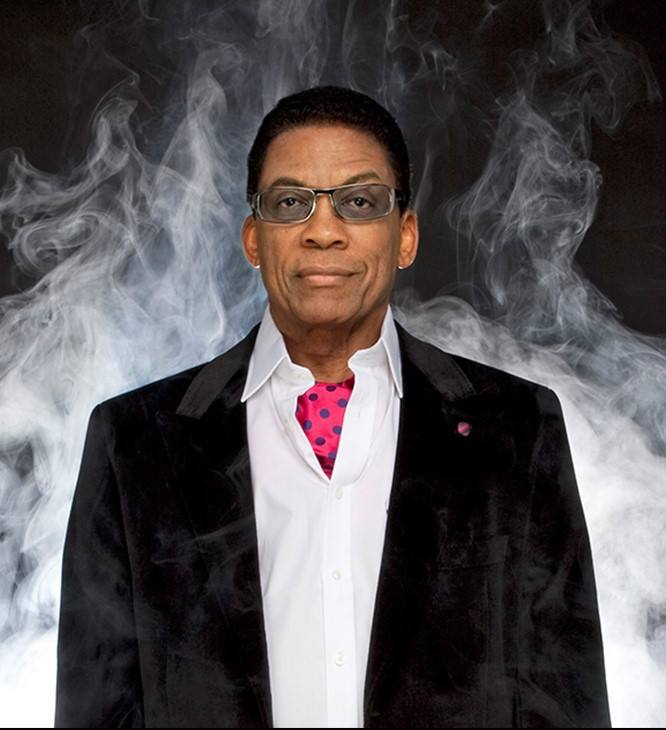Herbie Hancock was born on this date in 1940. He is an African American musician, composer, and arranger.
From Chicago his parents weren’t professional musicians but lovers of the art form. His father was a bathtub singer and mother played a little piano. Hancock was always interested in music as a very young child, and began music lessons at seven. At the age of 11 he performed with the Chicago Symphony Orchestra. As a teenager at Hyde Park High School Hancock formed his own jazz band. He attended Grinnell College, majoring in engineering for two years, and then changed his major to music. He graduated from Grinnell in 1960 with a major in music composition where during he won an award for the best musical composition with a suite for six woodwinds.
After graduation, he left Iowa for New York City and at age 20, hooked up with trumpeter Donald Byrd. Byrd introduced him to Blue Note Records where Hancock recorded his first solo album in 1963, Taking Off, which included appearances by Freddie Hubbard and Dexter Gordon. This album contained his first Top 10 hit, “Watermelon Man.” Soon Hancock got the attention of the legendary Miles Davis, who invited Hancock to join his new group. While working with Miles, Hancock was introduced to and developed an interest in funk, particularly James Brown and Sly Stone. After working with Davis for several years Hancock decided to form his own band — the Headhunters– a sextet that included Julian Priester, Buster Williams and Eddie Henderson.
With this group Hancock began to pioneer what would later be called fusion as he, through his original compositions, melded ideas of funk and rock with jazz. Hancock took this opportunity to introduce himself to synthesizers. The innovative Headhunters (1973) was the first album on which Hancock used a synthesizer. Up to that point his work was acoustic with the exception of a Rhodes Electric Piano. The album, which became the largest-selling jazz album in history, contained “Chameleon,” another of Hancock’s crossover hits. Incorporating synthesizers at this pace was mitigated by Hancock’s experience with electronics and aptitude for the subject. After a few years, Hancock returned to his roots as an acoustic pianist with the V.S.O.P. Quintet, a recreation of Miles’ band (without Miles), and several other jazz artists. In 1983, Hancock released Future Shock, which was both a pioneer electronic piece but also a hit on both R&B and dance charts. The single “Rock It” won Grammy for best R&B Instrumental, and the album went gold.
Hancock released Dis is Da Drum in 1994, which reverberates with West African rhythms. In 1997 Hancock released 1+1, a duet session with saxophonist Wayne Shorter. The following year he reunited with his old Headhunter band mates, to record, Return of the Headhunters. Since then he has recorded Future2Future LIVE DVD. and THE HERBIE HANCOCK BOX. A definitive 4-CD retrospective spanning 17 years, sampling 25 albums & Herbie’s vast musical world! In 2003, Hancock with Michael Brecker and Roy Hargrove traveled as “Directions In Music (Celebrating Miles Davis & John Coltrane)”.
In June 2010 Hancock released The Imagine Project. On June 5, 2010 Hancock received an Alumni Award from his alma mater, Grinnell College. On July 22, 2011, at a ceremony in Paris, Hancock was named UNESCO Goodwill Ambassador for the promotion of Intercultural Dialogue. In 2013 Hancock joined the University of California, Los Angeles faculty as a professor in the UCLA music department where he will teach jazz music. On December 8, 2013 he was given the Kennedy Center Honors Award for achievement in the performing arts with artists like Snoop Dogg and Mixmaster Mike from the Beastie Boys performing his music.
Hancock appeared on the 5th Flying Lotus studio album, You’re Dead, released in October 2014.
Hancock is the 2014 Charles Eliot Norton Professor of Poetry at Harvard University. Holders of the chair deliver a series of six lectures on poetry, “The Norton Lectures”, poetry being “interpreted in the broadest sense, including all poetic expression in language, music, or fine arts.” Previous Norton lecturers include musicians Leonard Bernstein, Igor Stravinsky and John Cage. Hancock’s theme is “The Ethics of Jazz.”
Since 1972, Hancock has practiced Nichiren Buddhism as a member of the Buddhist association Soka Gakkai International. As part of Hancock’s spiritual practice, he recites the Buddhist chant Nam Myoho Renge Kyo each day.
In 2013, Hancock’s dialogue with musician Wayne Shorter and Soka Gakkai International president Daisaku Ikeda on jazz, Buddhism and life was published in Japanese.
Written by Dianne Washington

